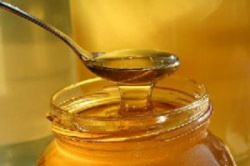Honey
Honey (madhu) is a sweet, viscous liquid produced by bees. It is made up of a complex mixture of sugars, fructose, glucose, organic acids, vitamins, minerals and water. The Buddha considered honey to be one of the five essential medicines (Vin.III,251), and because of its ability to absorb water, it is even today used as a healing and a restorative agent. According to legend, just before the Buddha’s enlightenment, a young woman named Sujātā offered him a bowl of milk rice and honey, a meal that gave him the strength for his final struggle. The Tipiṭaka tells us that the Buddha’s first meal after his enlightenment was barley gruel and honey balls (mantha, madhupiṇḍika) given to him by the merchants Tapussa and Bhallika (Vin.I,4). For these reasons, Buddhists have long considered honey to be a particularly auspicious food. The Buddha said that the person whose speech is ‘blameless, pleasant, easy on the ear, agreeable, going to the heart, urbane, pleasing and liked by everybody’ can rightly be called ‘honey-tongued’ (A.I,128). He also said that a lay disciple should earn his or her livelihood the way a bee collects honey (D.II,188), i.e. by diligent hard work and without harming the source of one’s income (Dhp,49). The Mahāvastu mentions that those who kill bees while smoking them out of their hives create negative kamma for themselves, a sentiment consistent with Buddhism’s general regard for all life.
